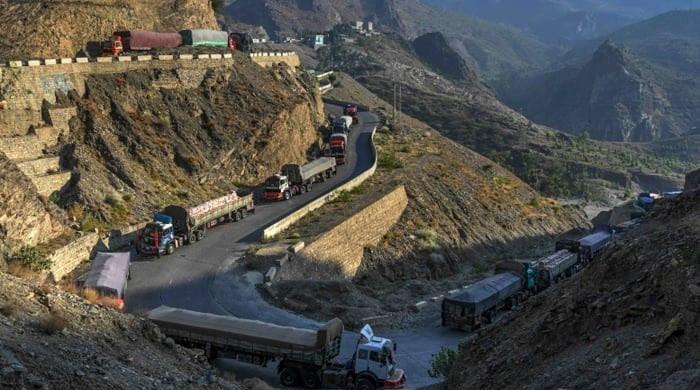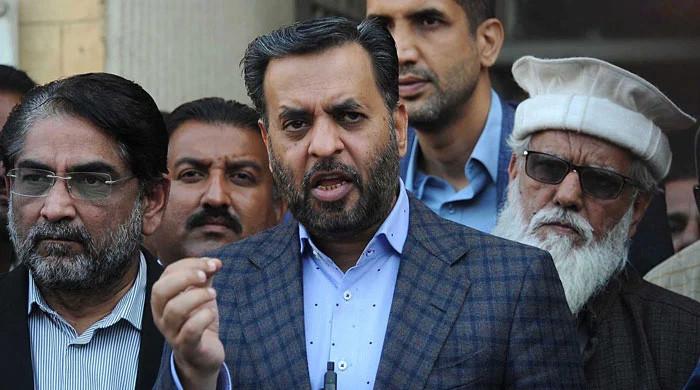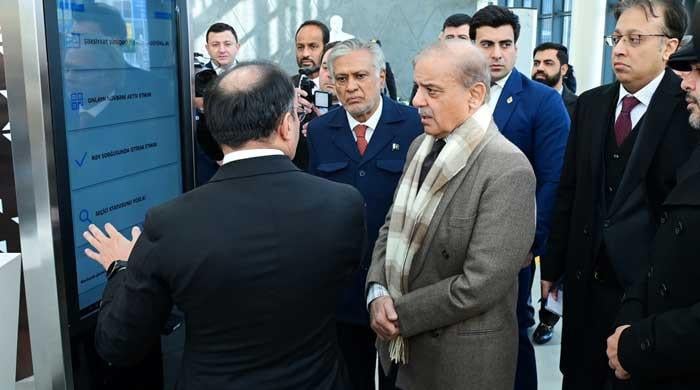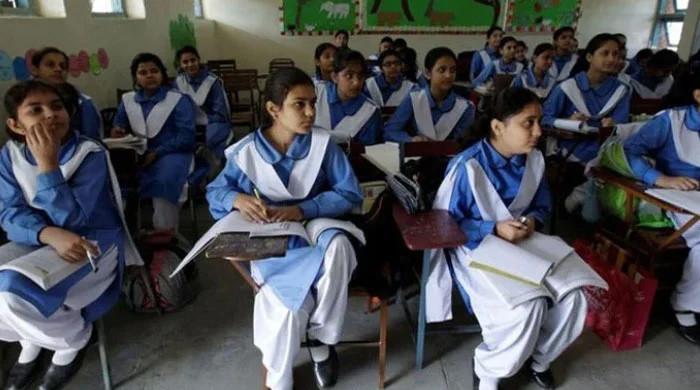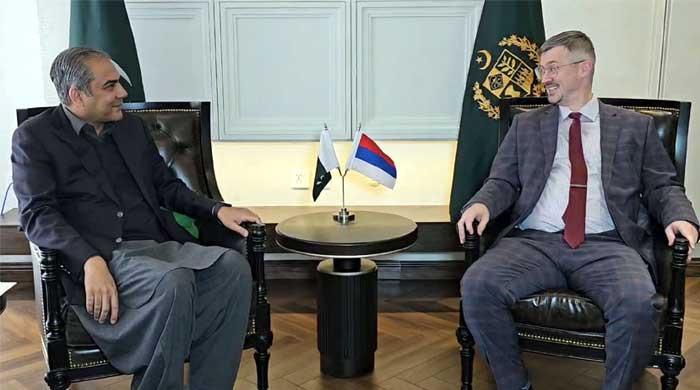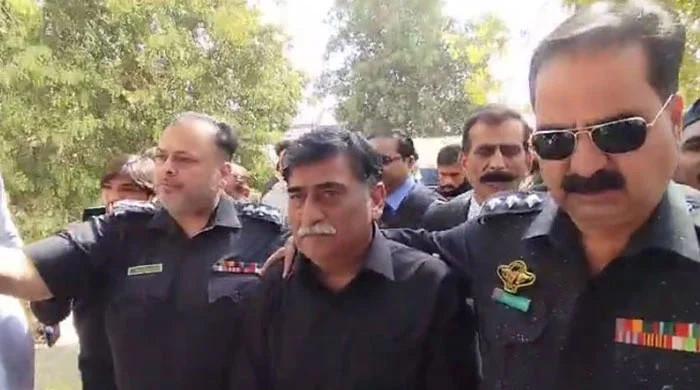Pakistan is at a tipping point, says President Arif Alvi in address to Parliament
Pakistan at that point where it should be reviewed what's been done in past and what should be done in future, President Arif Alvi says
August 20, 2020
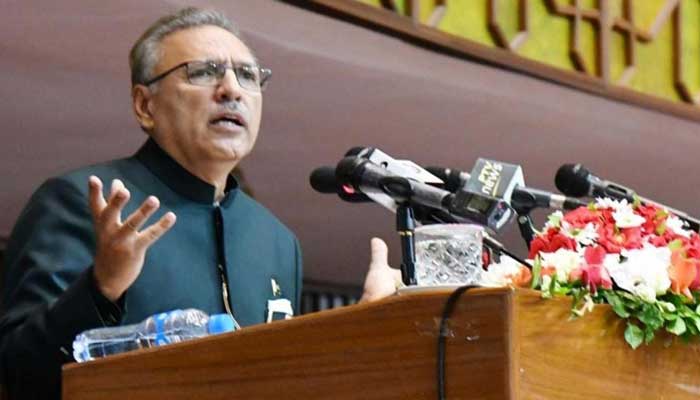
ISLAMABAD: President Dr Arif Alvi on Thursday recounted the PTI government's performance over the past two years in his address to a joint session of the Parliament, praising Prime Minister Imran Khan for withstanding pressure over the coronavirus strategy.
Prime Minister Imran Khan — who met National Assembly Speaker Asad Qaiser shortly before the session started — was also present in the House as were Shahid Khaqan Abbasi, Raza Rabbani, Mushahidullah Khan, Raja Pervaiz Ashraf, Maulana Asad Mehmood, and Sardar Ayaz Sadiq.
Top Opposition leaders Shehbaz Sharif, Asif Ali Zardari, and Bilawal Bhutto-Zardari, however, were not present nor was BNP-M leader Akhtar Mengal due to having contracted the coronavirus.
Members of the Opposition parties protested and chanted slogans against the PTI government while the JUI-F staged a walkout shortly after the session commenced.
In his speech, Alvi congratulated the House for completing two years, saying he was honoured to be speaking there for the third time. He also lauded the PTI government for its performance, saying he would present its wins to the House.
"Pakistan is at that point where it should be reviewed what has been done so far, what should have been done, and what should be done in the future," he said.
The nation has had three lessons in the past, he added, noting that no chance should be wasted to remind the people of Pakistan of what they have learnt and what they have achieved, and how they are on the way to becoming a great country.
"We all collectively fought terrorism. Pakistan is the only nation that fought terrorism," he added, congratulating the politicians and armed forces for the win against the menace.
"We also provided a home to the 3.5 million Afghan refugees, we welcomed them with open hearts, and no politician or government spoke ill of them," he added.
The president highlighted how "100 refugees were stranded in the Mediterranean" after "global powers that lectured us on refugees refused to let them in".
"Pakistan set up an example, Pakistan told the world how it lectured us but showed how we welcomed the [Afghan] refugees," he added.
Alvi also listed a third victory — the battle against extremism. "The importance of this one is even more considering what's going on in our east-side neighbouring country, where extremism is rising," he explained.
He underlined how when the incumbent government came into power, there was "a huge burden of debts, corruption was rife, and the economy was on a downtrend".
"The first year, I, too, was worried; people advised me to sign a deal with the IMF [International Monetary Fund] or ask for assistance from friendly nations.
"But whatever we decided has led to positive effects on our economy," he added.
The president lamented how the situation at present was such that "good news is not promoted".
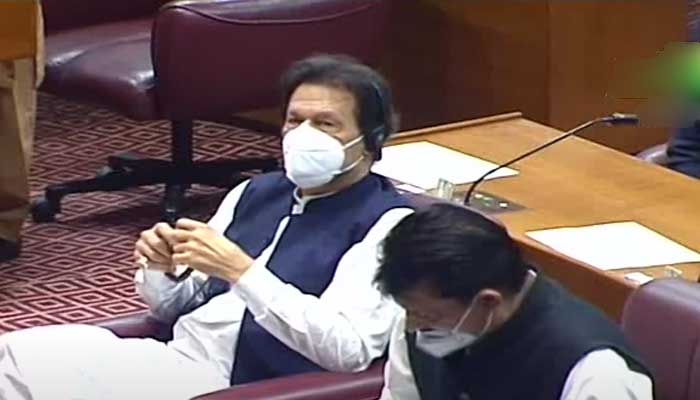
"Our nation is young. Instead of giving it strength, there's more talk in the media and elsewhere of what it didn't do. [This leads to] depression being created that a nation that should be growing ends up losing motivation.
"This is a major injustice and I challenge you here that this is the time when you tell the nation to rise and stand up, instead of telling it that it won't be able to do so," he said.
"Nations are built based on strong and visionary decisions, not just on science and data but on the basis of compassion. I believe the vision and priorities should be clear in the mind of the nation and only then it becomes a true vision.”
"Speaking of science and data, I'm reminded of [Muslim military commander] Tariq ibn Ziyad. Science and data and realism dictated not to burn the boats, one is in a new country but one should keep open the way back regardless of whether one wins the battle or not.
"But [Tariq ibn Ziyad] burned his boats. I believe the vision and priorities should be clear in the mind of the nation and only then it becomes a true vision.
"So what was the vision that we created? That we will not let the poor die of starvation," he said, referring to the controversy over complete and smart lockdowns in Pakistan to contain the coronavirus.
"We made use of foresight. What we did was completely different to all the pressure, all the data, and whatever the rest of the world was doing.
"With regard to the mosques, daily and taraweeh prayers stopped in mosques in 57 Muslim countries but through the SOPs [standard operating procedures], the ulema — in collaboration with the government — took a good step to allow people to continue praying in the mosques. There was a smart lockdown for coronavirus.
"Two or three days ago, I met a few journalists who used to say they failed to understand this [trend of coronavirus cases]; but you and I, we are able to understand, right? God only helps those who care for the common people and the poor and the ummat.
"We made use of foresight. What we did was completely different compared to the pressure, all the data, and whatever the rest of the world was doing.
"Our smart lockdown led to lower deaths and reduced exposure [to the coronavirus] and, today, just before coming here I read that in India, on Wednesday, 70,000 new cases were identified. And in Pakistan? Only 600.
"There must be something we did, right? We're genetically similar, we have the same atmosphere and resources, but we did something good.
"With the elitist lockdown, [the Indian leadership] effectively told people they should go back and that business had been closed down. People walked back home 1,500 miles.
"In comparison, Pakistan did the compassionate thing and we demonstrated what our Constitution says. Caring for the poor leads to bonding among the people, unity of the nation, and blessings from God," he said.
"Therefore, I believe the government deserves commendation for its efforts against the coronavirus [pandemic] and the world agrees."
The president stressed there was no moment in the country's history as far as he could remember when the world had looked up to Pakistan to learn from it. There were two nations — Japan and the Philippines — that had admitted it was possible to learn from Pakistan's efforts against the coronavirus.
He lauded the media for encouraging and reminding people to follow the SOPs, as well as the ulema, doctors, and paramedical staff for their services. He also appreciated the National Command and Operations Centre (NCOC), the National Disaster Management Authority (NDMA), and PM Imran for withstanding pressure and remaining steadfast.
With regard to the Ehsaas Emergency Cash Programme, he said 16.9 million benefitted from Rs12,000 per family, effectively translating into 80-90 million people assisted by the government of Pakistan. "This compassion is something that God probably liked and then He helped us in the coronavirus [pandemic]," he noted.
The president, while speaking about the Single National Curriculum (SNC), said it would help create one nation. "It won't be that the children of wealthy parents learn differently," he added, noting that graduates of elite institutes were a different class than the common people.
"We provided 50,000 scholarships in one year. This is important because, in the past 17 years, only 23,000 scholarships were awarded," he noted.
There was exemplary work done in health as well, he said. "It had been said earlier that people would die on the roads but we set up hospitals and none of the facilities there — such as ventilators — were used more than 40-60%.
"People could say we are a poor nation and our preparations cannot match but we 'over-matched'," he added.
However, Alvi said some battles still remained for Pakistan, including tuberculosis (TB), hepatitis — "9% of Pak population suffers from hepatitis" — as well as malnutrition and stunting growth.
"The prime minister's experience in health helped the nation, he spoke of stunting, as well as of population growth. According to the Holy Quran, breastfeeding can help reduce malnutrition and stunting and instructions provided in the Holy Quran can show the way ahead for people.
President Alvi appealed to ulema, media, and everyone to speak about healthy population, including that for women, such as gaps between pregnancies and recovery of mothers.
Speaking of the special needs people, the president said Pakistan should "not forget them" and to bring them into the mainstream. "The laws are present and only implementation is needed.
"I'm working on this in the universities and efforts are being made in the commercial organisations," he added.
He said he believed the people were "misers in terms of women's inheritance rights".
Referring to Surah Al-Nisa, he requested the ulema for guidance because "women empowerment would only occur through this and when inheritance is given to the women in accordance with God's laws".
With regard to the economy, Alvi emphasised that Pakistan registered gains despite the coronavirus pandemic.
The current account deficit reduced from $20 billion to $8.5 billion, he said, and corrected himself by saying it was $3 billion when someone pointed it out.
The president also noted that updates from international credit rating agencies Moody's and Fitch showed that Pakistan had become stable and positive, while the Pakistan Stock Exchange (PSX) indicated that people had hope for good in the future as it rose beyond the 40,000-point mark.
Remittances shot up from $20 billion to $23 billion and were at a historical record in July, he said.
"This is the confidence of overseas Pakistanis and this is a good opportunity to promise again to our overseas Pakistanis brethren about voting rights. I urge this government not to let this go and ensure their voting rights are established in 2023 or before.
The president said the government had released a construction package, that the ML-1 Railways project was a "big game-changer", and that the China-Pakistan Economic Corridor (CPEC) was going on as usual.
The work on the Diamer-Bhasha Dam project had sped up, he said, adding that it would help in water storage and produce electrical energy worth 4,500 megawatts (MW).
"I need to emphasise that the government still needs to stop smuggling and circular debt in the power sector," Alvi said.
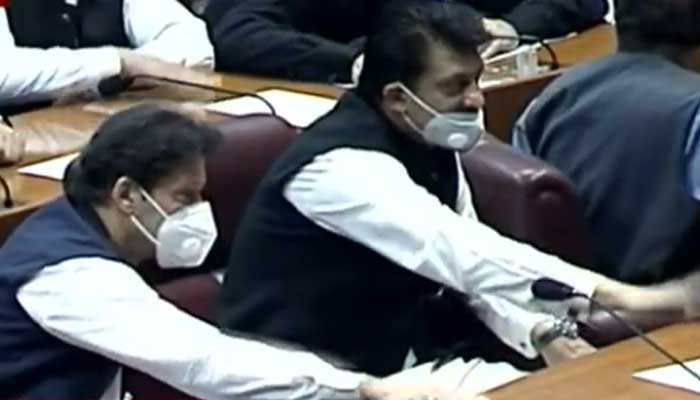
He also spoke of the Kamyab Jawan Programme and Sehat Sahoolat Card, noting that 100% health coverage had been ensured in Khyber Pakhtunkhwa.
Panagahs (shelter homes) had also been established, he added.
The government gave a Rs280-billion package to agricultural sector, which saw a growth of 2.3%, he added, noting that cheap electricity was provided to tube-wells and that the export of mangoes had shot up.
Speaking of Kashmir, the president said: "I congratulate PM Imran, who vowed to be Kashmir's ambassador since the start and spoke about it in the United Nations.
"Our government pushed four or five times for the Kashmir issue to be discussed in the UN Security Council. This is a win, we're all united in this. We condemn India's steps of August 5, 2019, violence and aggression in Kashmir, and [the treatment of] Muslims and minorities in India.
"In India, violence is being egged on. Look at the CAA [Citizenship (Amendment) Act, 2019], registration act [National Register of Citizens (NRC)], the isolating of minorities.
"India has violated all agreements, resolutions, including the Geneva Conventions, Human Rights Charter [Universal Declaration of Human Rights (UDHR)], Simla Agreement, UNSC Resolutions.
"Soon, Kashmir would be free. This Hindutva fascist situation cannot continue on anymore," he added.
He also congratulated the premier for "speaking directly on the Israel issue immediately", underlining that Pakistan did not recognise Israel.
"Seeing this, other nations also gathered courage. We clearly said that until Palestinians are given their rights and their own state, in line with Quaid-e-Azam's point of view, Pakistan won't recognise Israel," he added.
Alvi also thanked Turkey, Malaysia, China, Azerbaijan, and Iran for their support on the Kashmir issue, saying "our friendship continues" and "our friendship with Saudi Arabia is very strong and we care about each other".
He said Pakistan was the second most-affected country due to the war, crises, and terrorism in Afghanistan and would also gain the most, after Afghanistan itself, from peace there.
"We want peace to be established in Afghanistan and we support the US-Taliban talks and talks between the Taliban and the Afghan government," he said.
With regard to environmental efforts, including the Billion Tree Tsunami Project, he said the goals for a clean and green Pakistan were clear and good for the country.
The president congratulated the Parliament for the passage of bills related to the Financial Action Task Force (FATF), anti-money-laundering, and terrorism.
Towards the end, he said the armed forces, the judiciary, the Parliament, the government, and the media of Pakistan were "all on one page".
"We all want legal, economic, and social justice, we're all in one direction. there's no compromise on corruption, and we all want to overcome hindrances in Pakistan's progress!"
In a message to the youth of Pakistan, Alvi said they should work hard and not let go of their values, rules, and traditions. "Do not let your belief in Pakistan falter because Pakistan is on way to progress.
"As the prime minister said, Pakistan is on a tipping point, whether anyone else sees or not, but for the first time in its history, Pakistan has a bright future that was never seen before," he added.




